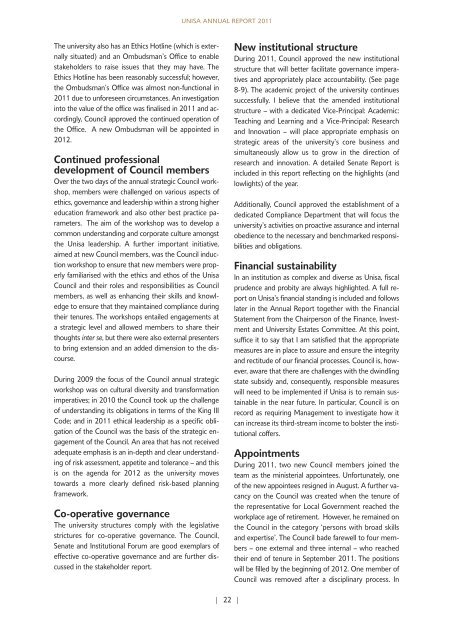Download the Annual report 2011 - Unisa
Download the Annual report 2011 - Unisa
Download the Annual report 2011 - Unisa
Create successful ePaper yourself
Turn your PDF publications into a flip-book with our unique Google optimized e-Paper software.
The university also has an Ethics Hotline (which is externally<br />
situated) and an Ombudsman’s Office to enable<br />
stakeholders to raise issues that <strong>the</strong>y may have. The<br />
Ethics Hotline has been reasonably successful; however,<br />
<strong>the</strong> Ombudsman’s Office was almost non-functional in<br />
<strong>2011</strong> due to unforeseen circumstances. An investigation<br />
into <strong>the</strong> value of <strong>the</strong> office was finalised in <strong>2011</strong> and accordingly,<br />
Council approved <strong>the</strong> continued operation of<br />
<strong>the</strong> Office. A new Ombudsman will be appointed in<br />
2012.<br />
Continued professional<br />
development of Council members<br />
Over <strong>the</strong> two days of <strong>the</strong> annual strategic Council workshop,<br />
members were challenged on various aspects of<br />
ethics, governance and leadership within a strong higher<br />
education framework and also o<strong>the</strong>r best practice parameters.<br />
The aim of <strong>the</strong> workshop was to develop a<br />
common understanding and corporate culture amongst<br />
<strong>the</strong> <strong>Unisa</strong> leadership. A fur<strong>the</strong>r important initiative,<br />
aimed at new Council members, was <strong>the</strong> Council induction<br />
workshop to ensure that new members were properly<br />
familiarised with <strong>the</strong> ethics and ethos of <strong>the</strong> <strong>Unisa</strong><br />
Council and <strong>the</strong>ir roles and responsibilities as Council<br />
members, as well as enhancing <strong>the</strong>ir skills and knowledge<br />
to ensure that <strong>the</strong>y maintained compliance during<br />
<strong>the</strong>ir tenures. The workshops entailed engagements at<br />
a strategic level and allowed members to share <strong>the</strong>ir<br />
thoughts inter se, but <strong>the</strong>re were also external presenters<br />
to bring extension and an added dimension to <strong>the</strong> discourse.<br />
During 2009 <strong>the</strong> focus of <strong>the</strong> Council annual strategic<br />
workshop was on cultural diversity and transformation<br />
imperatives; in 2010 <strong>the</strong> Council took up <strong>the</strong> challenge<br />
of understanding its obligations in terms of <strong>the</strong> King III<br />
Code; and in <strong>2011</strong> ethical leadership as a specific obligation<br />
of <strong>the</strong> Council was <strong>the</strong> basis of <strong>the</strong> strategic engagement<br />
of <strong>the</strong> Council. An area that has not received<br />
adequate emphasis is an in-depth and clear understanding<br />
of risk assessment, appetite and tolerance – and this<br />
is on <strong>the</strong> agenda for 2012 as <strong>the</strong> university moves<br />
towards a more clearly defined risk-based planning<br />
framework.<br />
Co-operative governance<br />
The university structures comply with <strong>the</strong> legislative<br />
strictures for co-operative governance. The Council,<br />
Senate and Institutional Forum are good exemplars of<br />
effective co-operative governance and are fur<strong>the</strong>r discussed<br />
in <strong>the</strong> stakeholder <strong>report</strong>.<br />
UNISA ANNUAL REPORT <strong>2011</strong><br />
| 22 |<br />
New institutional structure<br />
During <strong>2011</strong>, Council approved <strong>the</strong> new institutional<br />
structure that will better facilitate governance imperatives<br />
and appropriately place accountability. (See page<br />
8-9). The academic project of <strong>the</strong> university continues<br />
successfully. I believe that <strong>the</strong> amended institutional<br />
structure – with a dedicated Vice-Principal: Academic:<br />
Teaching and Learning and a Vice-Principal: Research<br />
and Innovation – will place appropriate emphasis on<br />
strategic areas of <strong>the</strong> university’s core business and<br />
simultaneously allow us to grow in <strong>the</strong> direction of<br />
research and innovation. A detailed Senate Report is<br />
included in this <strong>report</strong> reflecting on <strong>the</strong> highlights (and<br />
lowlights) of <strong>the</strong> year.<br />
Additionally, Council approved <strong>the</strong> establishment of a<br />
dedicated Compliance Department that will focus <strong>the</strong><br />
university’s activities on proactive assurance and internal<br />
obedience to <strong>the</strong> necessary and benchmarked responsibilities<br />
and obligations.<br />
Financial sustainability<br />
In an institution as complex and diverse as <strong>Unisa</strong>, fiscal<br />
prudence and probity are always highlighted. A full <strong>report</strong><br />
on <strong>Unisa</strong>’s financial standing is included and follows<br />
later in <strong>the</strong> <strong>Annual</strong> Report toge<strong>the</strong>r with <strong>the</strong> Financial<br />
Statement from <strong>the</strong> Chairperson of <strong>the</strong> Finance, Investment<br />
and University Estates Committee. At this point,<br />
suffice it to say that I am satisfied that <strong>the</strong> appropriate<br />
measures are in place to assure and ensure <strong>the</strong> integrity<br />
and rectitude of our financial processes. Council is, however,<br />
aware that <strong>the</strong>re are challenges with <strong>the</strong> dwindling<br />
state subsidy and, consequently, responsible measures<br />
will need to be implemented if <strong>Unisa</strong> is to remain sustainable<br />
in <strong>the</strong> near future. In particular, Council is on<br />
record as requiring Management to investigate how it<br />
can increase its third-stream income to bolster <strong>the</strong> institutional<br />
coffers.<br />
Appointments<br />
During <strong>2011</strong>, two new Council members joined <strong>the</strong><br />
team as <strong>the</strong> ministerial appointees. Unfortunately, one<br />
of <strong>the</strong> new appointees resigned in August. A fur<strong>the</strong>r vacancy<br />
on <strong>the</strong> Council was created when <strong>the</strong> tenure of<br />
<strong>the</strong> representative for Local Government reached <strong>the</strong><br />
workplace age of retirement. However, he remained on<br />
<strong>the</strong> Council in <strong>the</strong> category ‘persons with broad skills<br />
and expertise’. The Council bade farewell to four members<br />
– one external and three internal – who reached<br />
<strong>the</strong>ir end of tenure in September <strong>2011</strong>. The positions<br />
will be filled by <strong>the</strong> beginning of 2012. One member of<br />
Council was removed after a disciplinary process. In

















